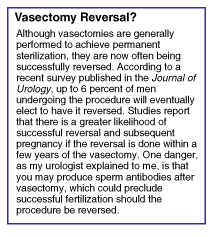Vasectomy: A Doctor's Perspective
Shortly after our last child, Hannah, was born the anesthesiologist
came by the hospital room to prepare my wife, Julie, for a tubal
ligation. The sterilization procedure required general anesthesia
as well as an extra day in the hospital, and I couldn't help but
feel guilty. Hannah's birth had been the smoothest of all of our
three children's, and Julie seemed well enough to go home just
hours after the birth. We didn't want to have any more children,
and as a physician I knew that a vasectomy was a simple outpatient
procedure. It just didn't make sense for Julie to undergo yet
another medical procedure at this stage. "I'll just have a vasectomy,"
I announced. "Let's go home." Julie agreed.
Two weeks later, I lay on the urologist's table as he chatted
with me about the stock market. I felt a burning sensation as
he injected the local anesthetic into my scrotum, and an equally
embarrassing flush as his two nurses, whom I knew well, watched
the doctor perform the procedure. After a few minutes he was done,
and one of the nurses escorted me to the dressing room, where
I quickly pulled my pants on and hurried out the door to work.
I felt fine. But that night, when I was called in to the hospital
for an emergency at 3 a.m., I could barely walk. The nurses at
the hospital laughed at me as I limped to see my patient. "You
should try having a baby if you think that hurts," joked the nursing
supervisor.
Tying the knot
In general, vasectomy is a simple, effective, and inexpensive
surgical procedure designed to achieve permanent sterility in
men. Vasectomy simply creates a physical impasse between sperm
and the outside world. Sperm is created in the testes and is eventually
transported through tiny tubes called the vas deferens. During
a vasectomy, the surgeon creates a small opening in the scrotum
after numbing it with a local anesthetic. Through this small opening,
the surgeon severs the vas deferens and then ties off or cauterizes
the ends. The entire procedure takes between 20 and 30 minutes.

Approximately 500,000 men have a vasectomy each year in the United
States, and most are pleased with the results. Vasectomy is an
extremely effective method of birth control, with a failure rate
of less than 1 percent. It causes no change in sexual drive or
performance. The testes still produce sperm cells, but they die
and are reabsorbed by the body. For a few days after the surgery,
discomfort is normal. A small percentage of men experience swelling
of the scrotum, severe pain, bleeding, inflammation, and even
infection, but these results are rare.
Myths and risks
You may be wondering if there are potential health risks involved
with vasectomy that may make it an undesirable option for birth
control. As with most health issues, there's plenty of false information
out there, as well as some real concerns.
-
Prostate cancer? No. Several years
ago, scientists raised the concern that vasectomy might cause
prostate cancer. The issue was debated in the media and at
medical conferences. The resulting studies do not indicate,
however, that vasectomy leads to a greater risk of prostate
cancer.
-
Testosterone production fluctuation?
No. I once had a patient who claimed his sexual prowess
was enhanced by his vasectomy. He even told his friends that
his vasectomy increased his level of testosterone. Knowing
this was impossible, since vasectomy does not affect sex hormones,
I finally came to the conclusion that his increased virility
was likely caused by his new spontaneous sex with his wife
more than anything else. They had five children, and now there
was no need to be concerned with condoms, pills, or spermicides.
For this patient, undergoing a vasectomy rekindled his romantic
spirit.
-
Autoimmune diseases? Possibly, with
genetic predisposition. For a very few number of men,
vasectomy has been known to lead to serious and chronic conditions.
There is an extremely small incidence of autoimmune diseases
like multiple sclerosis and rheumatoid arthritis following
vasectomy. In my own case, I developed insulin-dependent diabetes
mellitus, also an autoimmune disease, just six months following
my vasectomy. Granted, I had the genetic predisposition to
develop the condition -- both my father and sister suffered
from it -- but it's possible that the vasectomy triggered
it. Prior to my procedure, no one ever discussed the risk
of autoimmune disease with me. Be sure to bring it up, and
be clear about your family history to make sure you are not
running any unnecessary personal risk.
In the vast majority of cases, vasectomy is an effective and
safe method of birth control. It is not for everyone, however.
As with any surgical procedure, be certain you do your homework
before consenting to it. Talk to your doctor. Surf the Internet.
If you know men who have had one, talk to them. Learn about the
benefits and risks. Vasectomy tends to be viewed by most doctors
as a simple outpatient procedure; generally it is performed as
minor surgery. But the truth is, surgery is surgery; it alters
your body permanently, and no matter how minor it seems, you need
to have a heart-to-heart with your doctor about whether it is
the best option for you.
Related links:
Rx.magazine feature story: Vasectomies
Aren't for Weenies ...
Outside link: Information
about vasectomies from JAMA's Contraception Information Center
Outside link: Facts
about vasectomy safety from the National Institute of Health

